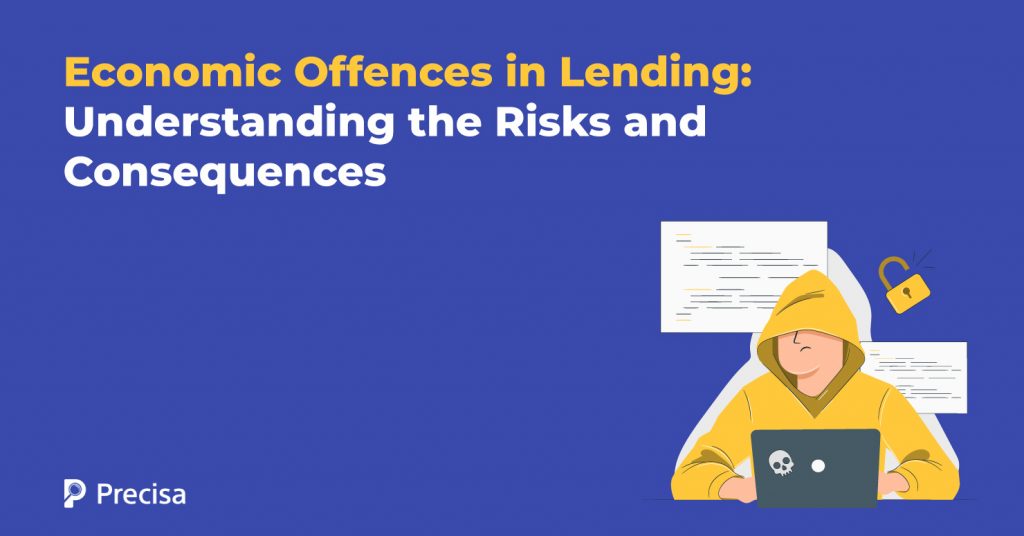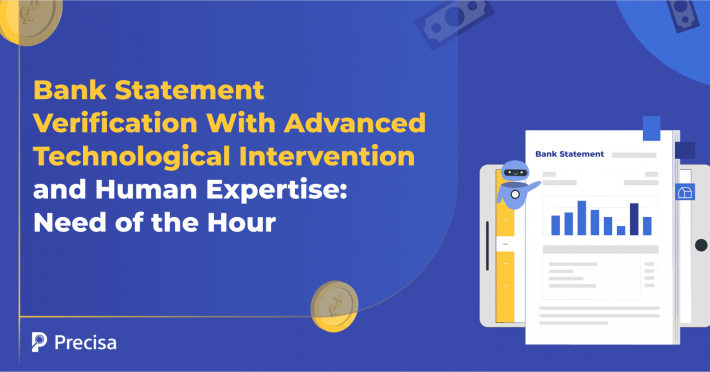Economic Offences in Lending: Understanding the Risks and Consequences

India’s financial sector faces mounting challenges as economic offences in lending grow increasingly sophisticated.
In the first half of FY 2024-25, bank frauds reached ₹21,367 crore, marking a sharp 27% rise YoY. This surge not only represents escalating fraud amounts but also reflects the evolving complexity of financial deceptions.
Beyond immediate financial losses, these crimes erode market confidence and strain institutional resources. As lending processes become more digitised, fraudsters continue to develop sophisticated methods to exploit system vulnerabilities. It necessitates greater diligence and robust safeguards on the lender’s side.
Let’s look at the evolving nature of economic offences, their associated risks, and consequences for financial institutions.
What Do Economic Offences Constitute?
Economic offences in the lending sector are the various frauds that are carried out with the intention of deceiving financial organisations.
These crimes have evolved from simple forgery of documents to complex multi-level systems and sophisticated digital manipulation. Their rising incidence prompted the Indian government to introduce a draft bill aimed at regulating unregulated lending activities.
A 2024 PWC survey revealed that 59% of Indian organisations experienced financial or economic fraud in the past 24 months, with procurement fraud being the top threat.
Major Types of Economic Offences in Lending

The landscape of lending fraud has evolved significantly, encompassing various complex deception methods. Here are the primary types of economic offences affecting lending institutions:
Loan Fraud Mechanisms
Fraudsters employ advanced techniques to manipulate financial data, creating false income statements, tax returns, and business records.
These deceptions include fabricated employment records, inflated asset valuations, and forged documentation designed to bypass standard verification processes.
Money Laundering
Using loans to integrate illegal funds into legitimate financial systems is a common tactic. Criminals use multiple accounts, shell companies, and structured deposits to disguise the origin of funds, making detection particularly challenging for lending institutions.
Cybercrime in Lending
These include unauthorised access to loan processing systems, manipulation of digital documentation, and identity theft through data breaches. The rise of digital lending has created new vulnerabilities that cybercriminals actively exploit.
Almost one-fifth of all cyber crimes (reported) impact the financial sector, according to the IMF.
Round-Tripping
In this case, funds borrowed from one institution are routed through various entities before returning to the original borrower.
This creates an illusion of legitimate business transactions while concealing the actual use of funds, often involving multiple jurisdictions and shell companies.
Understanding the Risks Associated with Economic Offences
Now, let us focus on the risks that result from such offences:
Financial Vulnerability
Economic offences strike at the core of financial institutions’ stability. The impact extends far beyond the immediate fraud losses, creating ripple effects throughout the lending system.
When fraudulent loans turn into NPAs, they not only damage the institution’s financial health but also restrict credit availability for legitimate borrowers.
With every rupee lost to fraud, it ultimately costs financial firms ₹4.64.
This mounting financial burden often forces institutions to adopt more conservative lending practices, further impacting their growth potential and market competitiveness.
Reputational Impact
Trust forms the cornerstone of financial relationships, and economic offences severely damage institutional reputations. Once trust erodes, rebuilding market confidence becomes a lengthy and challenging process.
The impact reaches beyond immediate customers to affect relationships with business partners, investors, and other financial institutions. This loss of credibility often results in reduced business opportunities and increased costs of operations.
Regulatory Consequences
Institutions found violating key regulations related to economic offences or failing to maintain stringent verification standards face severe consequences. These can range from substantial monetary penalties to operational restrictions that affect business continuity.
The challenge intensifies as regulatory frameworks continuously evolve to address emerging fraud threats, requiring institutions to constantly update their compliance measures and control systems.
Operational Disruption
Managing economic offences strains institutional resources significantly. Enhanced verification processes delay legitimate transactions, while fraud investigation diverts staff from core business activities.
The need for continuous system updates, staff training, and process refinements creates additional operational complexities that affect overall efficiency and customer service delivery.
Market Position Erosion
Cumulative impacts of fraud incidents can permanently alter competitive positioning. These incidents often force institutions to implement restrictive lending policies, limiting their ability to serve existing customers and attract new ones. Competitors capitalise on these vulnerabilities, leading to a loss of market share and business opportunities.
This erosion of market position can take years to reverse, particularly in an environment where customers have multiple lending options and institutional trust is paramount.
4 Consequences of Economic Offences
Economic offences create profound impacts that extend far beyond individual institutions, potentially destabilising entire financial systems and eroding industry-wide trust. Understanding these broader consequences is crucial for addressing the issue:
Economic Growth Impediment
Financial crimes significantly impact economic development by deterring investment and reducing market confidence. When lending institutions face repeated fraud, their ability to support business growth diminishes. This particularly affects emerging sectors and small businesses that rely heavily on institutional credit for expansion.
Regulatory System Strain
The surge in economic offences places unprecedented demands on regulatory frameworks.
Supervisory bodies must divert substantial resources toward fraud investigation and resolution, often compromising their ability to focus on market development and innovation support. This strain on regulatory systems affects overall market efficiency.
Borrower Cost Escalation
Financial institutions often respond to fraud losses by implementing stricter lending criteria and increasing borrowing costs.
This defensive approach results in higher interest rates and enhanced due diligence requirements, making credit less accessible and more expensive for legitimate borrowers.
Innovation Resistance
Persistent fraud threats often lead institutions to adopt conservative approaches rather than embracing technological advancement.
This limits the adoption of digital lending solutions and innovative financial products, potentially reducing the sector’s competitiveness and service quality.
Key Takeaway
Economic offences in lending have evolved into sophisticated threats requiring robust preventive measures. Comprehensive risk management, enhanced due diligence, and technological solutions are no longer optional but essential for institutional survival and growth.
Precisa’s Anti-Money Laundering Analysis system offers advanced detection capabilities designed to combat financial crimes effectively. This sophisticated platform combines transaction monitoring, pattern recognition, and risk assessment tools to identify potential fraud before it impacts your institution.
The comprehensive solution suite also includes Bank Statement Analysis for deep transaction insights and Account Aggregator Integration for secure data verification.
Contact Precisa today to enhance your institution’s defence against economic offences.



